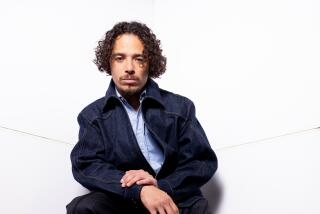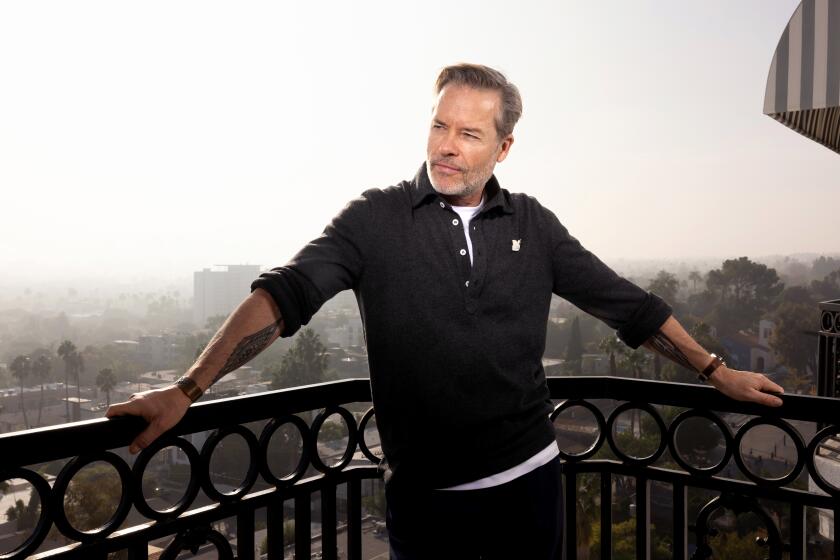Ai Weiwei’s acting debut ‘a bit more badass than big teddy bear’
- Share via
BEIJING -- Sculptor, dissident, activist, blogger, rock ‘n’ roller, barber. Multi-hyphenate Ai Weiwei wasn’t really in need of another descriptor, but now you can add this: actor.
The roly-poly, 56-year-old Chinese artist makes his acting debut in a 10-minute sci-fi short called “The Sand Storm” filmed in Beijing in early 2013. The existence of the project wasn’t widely known until this week, when the film’s writer-director, Jason Wishnow, launched a $33,000 Kickstarter campaign to fund post-production work (it’s already exceeded the goal).
The movie, shot by Australian cinematographer Christopher Doyle -- a frequent Wong Kar-Wai collaborator on films including “Chungking Express” and “In the Mood for Love” -- features Ai as a nameless smuggler in a world without water, bringing the liquid of life to others. Wishnow says Ai is “a bit more badass than big teddy bear in this movie.”
PHOTOS: On the set of “The Sand Storm”
“He walks a razor’s edge between being very serious and very playful, in real life as well as in this movie,” said Wishnow, who hopes to use the short as a launching pad for a full-length feature. “He channels some of himself in this role.... It’s something only Ai Weiwei could play.”
In a short clip promoting the film, Ai says the movie is “quite scary.” (Watch it below.)
Wishnow, 40, who previously made films for TED Talks, stumbled into the project after arriving in Beijing in 2012 on what he called a self-imposed writing retreat. (“It seemed like a perfect place to go because the Internet would be blocked for me,” cutting down on distractions, he said.)
Not long after Wishnow landed in Beijing, the city was deluged by heavy rains that led to massive flash floods, killing 79 people and stranding hundreds of thousands as roadways filled with water. Wishnow himself had to hitchhike back to a part of town with a bunch of strangers in a delivery truck.
“That was my first week in Beijing. I was encountering these disastrous moments and thinking ... about how people behave and treat strangers and also those close to them,” Wishnow recalled. “And that leads back to the flow of information.”
Thanks to his TED connections, Wishnow was invited to meet Ai and they ended up talking about the floods. “Our conversation about the flow of information inspired the ideas of a film about a water shortage,” Wishnow said.
A few days later, Wishnow went to Ai and told him about his idea for the film. “I said it would be fiction -- sci-fi; the premise is a future city runs out of water and you are a smuggler. He smiled when I said that, and just said: ‘I love sci-fi; how fast can you write a script?’ So I went off to write the script.”
Wishnow finished the screenplay and sent it to Ai. While he waited for a response, an associate arranged for a copy to be sent to Doyle.
“By chance, they both arranged to have meetings with me on the same day, Chris by Skype from Hong Kong and Ai in person,” Wishnow said. “I knew whatever they had in store would completely change my life.”
Three days later, Doyle came to Beijing, and the three had lunch and then went location scouting. Doyle and Ai, despite having many mutual acquaintances, had never met before and hit it off.
With the Chinese New Year holiday fast approaching, the team decided to rush the movie into production. In two weeks they assembled a crew, cast the film and built sets. Actual filming took two days. The dialog is in Mandarin.
Wishnow and his team decided to keep the project under wraps until it was closer to completion. (Doyle and Ai would go on to team up on Ai’s first music video, which was released in May 2013.)
PHOTOS: Behind the scenes of movies and TV
This week, Ai opened a new exhibit in Berlin, “Evidence,” which draws on his run-ins with Chinese authorities, including his 81-day detention in 2011. He remains unable to leave China because officials confiscated his passport three years ago and have refused to return it to him.
He recently filmed a video asking the Beijing Public Security Bureau to give it back.
They’ve “promised many many times,” he says in the clip, but never deliver. “I never get a clear answer.”
Wishnow says he has “no idea” what the Chinese government will think of “The Sand Storm” or whether it will create further tension between Ai and the government.
“I wasn’t setting out to make a film that’s an overt political statement, a message-y film,” he said. But “given the scope of the subject matter and who one of the stars is … I maintained a degree of discretion to avoid the discomfort of constantly having to explain that.”
Wishnow says he’s aiming to finish the film by summer, premiere it at a festival, then roll it out online. (“Every time I see Ai Weiwei, the first thing he asks is, ‘Why isn’t this done yet?’” the director said. “And I say, ‘I know, it took you less time to build an Olympic stadium.’”)
Asked if he could divulge any more details about “The Sand Storm,” such as whether Ai has any love scenes or gets naked in the film, Wishnow said: “There are no nude scenes involving Ai Weiwei. But we did shoot in subfreezing weather, so that was mainly so no one would get frostbite. If there is a [full-lenghth] feature and Ai Weiwei wants to get naked in it, that’s something we can discuss at that point.”
More to Read
Only good movies
Get the Indie Focus newsletter, Mark Olsen's weekly guide to the world of cinema.
You may occasionally receive promotional content from the Los Angeles Times.











